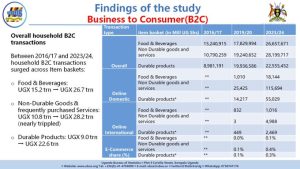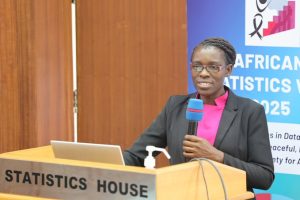Uganda’s household spending has surged dramatically over the last seven years, with Business-to-Consumer (B2C) transactions nearly tripling from UGX 34.2 trillion in 2016/17 to UGX 77.4 trillion in 2023/24, according to fresh data shared during a professional seminar held today at UBOS headquarters.
Presenting the findings, Senior Statistician Ezra Bwambale highlighted the transformative role of digital technologies in fueling economic activity, noting that they now contribute about 5% of global GDP and 3% of global employment, with the Global South registering the fastest growth in adoption.
Household Spending Shows Explosive Growth Across All Categories
Between FY 2016/17 and 2023/24, household B2C transactions surged across all major item baskets: Food & Beverages increased from UGX 15.2 trillion to UGX 26.7 trillion; Non-Durable Goods & Frequently Purchased Services soared from UGX 10.8 trillion to UGX 28.2 trillion, marking the strongest expansion, and Durable Products more than doubled, rising from UGX 9.0 trillion to UGX 22.6 trillion, reflecting improved consumer confidence and purchasing power.

UBOS analysts say the broad-based increases signal rising household consumption, a key indicator of economic resilience and recovery.
Domestic E-Commerce Takes Off
While traditional offline spending remains dominant, domestic e-commerce has registered remarkable strides. Between FY 2019/20 and 2023/24, online B2C transactions expanded nearly threefold, with the overall e-commerce share rising from 0.3% to 0.8% of total B2C value.
Online Domestic Platforms: Non-Durable Goods & Services grew sharply from UGX 25.4 billion to UGX 115.7 billion, Durable Goods jumped from UGX 14.2 billion to UGX 55.0 billion, and Food & Beverages climbed from UGX 1 billion to UGX 18.1 billion.

Online International Purchases: Though still relatively small, international online transactions experienced rapid acceleration. Non-Durable Goods & Services alone surged from UGX 3 million in 2019/20 to nearly UGX 5 billion in 2023/24.
Ethical Use of Digital Information Stressed
During the same seminar, Ms Florence Nambooze, Chairperson of the UBOS e-Resource Functional Committee, cautioned participants against downloading and redistributing electronic resources for commercial use, calling the practice “unethical and illegal.”
What the Trends Mean for Uganda
Economists interpret the data as evidence of a vibrant, expanding domestic economy driven by rising household demand, rapid digitisation, and shifting consumer habits.

The steep rise in non-durable goods and services points to increased essential consumption, while the growth in durable products reflects higher long-term investment by households. Meanwhile, the consistent upward trend in e-commerce underscores Uganda’s growing digital maturity.
Experts say sustaining this growth will require strategic investment in digital infrastructure, logistics, and secure online payment systems to support the fast-evolving digital marketplace.
UBOS’s findings come as Uganda accelerates its national agenda on digital transformation and economic modernisation — trends that are clearly beginning to show measurable impact in households across the country.











